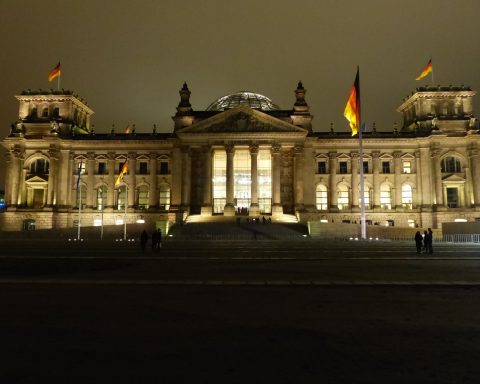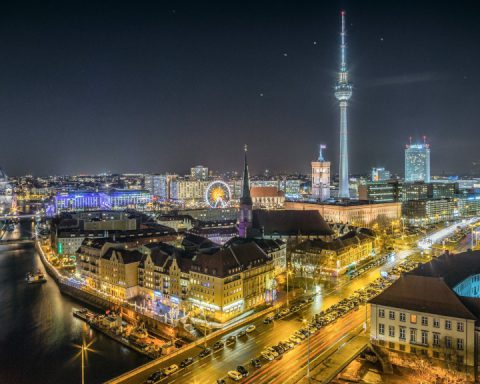How the U.S.A. has ended up with Trump
The U.S. presidential election is here, finally. On Tuesday, November 3rd, American voters are to decide whether they want to prolong or end what has arguably been the most unusual presidency in the country’s history. Four years ago, before the 2016 election, nobody could (or wanted to) imagine that Donald Trump – a quite repulsive human being without political record – would have any chance to move into the White House. Yet he did, and now, before the 2020 election, he does have a real chance to win a second term, despite countless scandals and glaring incompetence.
Why is that so? And how could Trump become president in the first place? Ever since voters started to embrace him, pundits have struggled to explain it. In the following, I will try to summarize what in recent months I have found in news reports, background articles, books and documentaries as to the reasons of Trump’s popularity – which certainly is one of the most disturbing phenomena of our time.

1. Some preliminary questions that are easier to answer: How did Trump get into politics, and why does he keep behaving there as he does? What does he want?
He floods the news with political declarations, but he is actually no politician.
He doesn’t care about the Republican Party, about conservatism, neoliberalism, Christianity, white supremacism or whatever ideological program you may link him to. No, the only thing he cares about is himself, Donald Trump. He is the textbook example of a narcissist since, as most famously his psychologist niece explained, his upbringing left him with an inerasable sense of inferiority and fear of failure. To compensate for this, he needs to constantly tell himself that he is “the best,” hear it from others, distort reality when it tells otherwise, and put others down to make himself feel good.
He lived out his disorder first as a real-estate developer, then as host of the TV show “The Apprentice.”
To add publicity to his name, Trump started commenting on politics in the 1980s. In 2000, he briefly ran for U.S. president. In 2011, he insisted that then President Obama had not been born in America. Obama therefore made fun of him at the White House correspondents’ dinner, with Trump among the guests. Obama satirically refuted the “birther” allegations and concluded that Trump could now “finally get back to focusing on the issues that matter – like, did we fake the moon landing?” It was the right response to a ridiculous, obviously racist conspiracy theory – but for a narcissist like Trump, it was a horrible humiliation that he couldn’t forget or forgive. Many assume that following that night, he swore to become Obama’s successor and undo his every political accomplishment.
Another narrative is that Trump, as political outsider, honestly didn’t expect to win in 2016 (on election night, he and his team looked most surprised by their victory), but campaigned nonetheless in order to reboot his failing businesses; in order to land new business deals thanks to his new fame.
Whatever narrative played a bigger role, politics became the third arena of Trump’s narcissism, and his “America First” here too means nothing but “Trump First” – which makes his political popularity all the more disturbing.

2. Trump became president on a ticket of the Republican Party. I don’t say “his” party because, as explained above, he is “Republican” in name only. On the other hand, it would be just as wrong to assert that the “Grand Old Party” has fallen victim to a “hostile takeover” by Trump, who forces all leading party members to either support him without condition or quit.
Instead, Trump is for the Republicans a highly powerful, welcome and fitting instrument to attain their political goals: minimal regulations and taxes for businesses, reduced immigration, conservative courts, etc.
As president, Trump has failed in many regards, but he did, as he had promised, implement various Republican policies – while the public was often being distracted by his scandals: He withdrew from the Paris Climate Agreement, lowered taxes especially for the wealthy, made it much more difficult for people from Central America to immigrate to the U.S., and more. Most importantly, he appointed conservative judges: not only three on the Supreme Court, but over 200 on lower federal courts. As federal judges are appointed for life, they will make the U.S. more “conservative”/Republican for decades to come.
Thus, while Trump talks (and tweets) a lot, he also just does many things regardless of how it may violate political traditions, embitter the opposition and divide the nation. Above all, he does anything to stay in power, unfettered by scruples or worries that other Republican presidents would have had.
Many Republicans still do not approve of Trump – as a human being. How could they, if they are devout Christians (in Trump’s lifestyle there is nothing Christian), honor the military (Trump holds them in contempt), believe in Transatlantic alliances (Trump irritated NATO partners), or loathe anti-American dictatorships (Trump curried favor with Russia’s Putin, China’s Xi and North Korea’s Kim Jong Un).
But for all that, Trump gives Republicans so much power (and in some cases personal pecuniary profit) that they are willing to sacrifice certain principles in exchange. Since 2016, Trump’s scandals have of course become worse, but he has also proven that he can “deliver.”
In their defense, government members may argue they still have some control over Trump, which they would lose if they left. For individuals, falling out of favor with Trump may also cost them their political future. And if Republicans abandoned Trump altogether, what would come in his stead? According to most conservatives, a return of the Democrats to power would be much worse.

3. One of the main goals Trump has proclaimed for his presidency is to fight America’s political and economic “establishment” – as he calls it: “draining the swamp.” As a billionaire and decades-long celebrity, however, he belongs to that establishment himself, and so do many in his administration (as well as Republican Congress): people (mostly white men) with high-profile careers in politics, big business or lobbyism, enormously wealthy themselves.
Nevertheless, Trump and his “team” were elected, and keep being supported by, lower- and middle-class people who would never be admitted in his golf clubs.
Before, they had mostly voted for someone like the opposite of Trump: Barack Obama. Thus, by far not all Trump supporters are die-hard conservatives, evangelicals, racists, sexists, gun nuts or whatever they appear to be (though many certainly are). Many of those who voted for Trump in 2016 voted not so much for him but rather against the alternative – the Democratic Party of Hillary Clinton, Obama and Joe Biden, because this Democratic Party had indeed let the lower and middle classes down.
Since the 1980s, the U.S. had undergone a massive deindustrialization. Most visibly, in the North East, the “Manufacturing Belt” became the “Rust Belt,” as jobs in steel and coal were lost to automation and international competition. Until then, car factories and the like had offered a living and advancement opportunities to generations of little educated Americans.
Now, the latter became losers of technological progress and globalization.
This was of course not the Democrats’ fault. But instead of addressing those Americans’ problems, the Democratic Party, which traditionally had been on the side of workers, became a party of urban elites. One of their chief concerns became identity politics, and their pride was to be led by a black president and a female presidential candidate.
It’s no doubt important to overcome the discrimination against certain societal groups. For Democrats, however, this became a fetish that let them lose touch with many people’s everyday lives: whether the country’s president is black or white, female or male, whether language is politically correct or all genders have their toilet – to unemployed people of whatever race or sex, this doesn’t really matter if they have no economic prospect.
But instead of respecting such people’s priorities, Democrats distanced themselves from them in arrogant scorn (“When they go low,” Michelle Obama said about Trump and his supporters in the 2016 campaign, “we go high”). Conversely, Democrats did not sufficiently distance themselves from the financial industry that had brought about the 2008 financial crisis. Many average Americans were ruined by it, but the Obama administration lacked the will to prosecute bankers and effectively regulate their businesses. Consequently, Wall Street has no problem donating money to Democratic presidential campaigns – in 2008, 2016 and 2020 it was more than to Republican ones.
Steve Bannon, infamous strategist of Trump’s 2016 campaign, recognized Americans’ frustration with how the government had (not) reacted to the financial crisis, and exploited it successfully. Trump himself repeated the insight in the final 2020 presidential debate, when he told his opponent, Obama’s Vice-President Biden: “I ran because of you. I ran because of Barack Obama, because you did a poor job.” Maybe he didn’t run because of the previous administration, but he won because of it. (Accordingly, in the debate, Biden had no response to Trump’s said remark.)

4. On the other hand, Trump and America’s conservatives don’t work for lower and middle classes either. Their policies too, and much more unashamedly, keep “the system” in power, make the rich richer and leave the poor and the weak in the lurch, with all the mercilessness of American individualism. Why then do so many of the poor and the weak support the Republican Party?
With his way of talking, Trump keeps presenting himself as an anti-politician, and some voters still find this refreshing, entertaining, fascinating: at last a political leader who dares to say what he thinks, even if he’s wrong or regularly changes what he says.
More importantly, for decades now conservatives have manipulated the public by inspiring them with fear: fear of a “socialist” America, fear of a “takeover” by blacks, Muslims or immigrants, fear of an ecological “dictatorship,” etc.
In reality, Democratic policies do not radically differ from Republican ones, as Democrats have proven again by choosing Biden, a harmless veteran of the Washington establishment, as their presidential candidate. When Republicans now paint him as a “socialist” as well, it’s not clear whether they still know it’s absurd, or whether they have come to believe in their own propaganda.
In any case, Republicans know one thing: most of them are white, but due to birth rates and immigration, whites will become a minority in America by 2050, and the Republican Party in its current state won’t win any more elections (or public offices for personal enrichment). Therefore they battle to “Make America White Again” (their true meaning of “Great”), and to convince people that things should return to the past.
To that end, conservative propaganda and misinformation is thrown at Americans every day on media outlets such as Fox (which doesn’t deserve the name “news channel”) as well as on social media. People who have been taken in by those contents live in their own world, whereas liberals who despise the propaganda likewise despise its followers. As a result, the “United States” has become the “Divided States of America,” where the other political side is perceived as an enemy to be destroyed.

Trump has taken the information war to yet another level with his lies about the most obvious things and his unfounded (but very calculated) allegations against everyone.
This too may go back to his former strategist Bannon: in 2018, he supposedly identified the media, which in a democracy exercise an important control over the government, as “the real opposition. And the way to deal with them is to flood the zone with shit.” That is, by constantly casting doubt on what people see and hear, at some point there is no such thing as “truth” anymore because everyone is dizzy with confusion. “Facts” become “opinions” – so that believing Trump is as good as believing a “reliable” source such as the New York Times.
I have presented four big factors of the Trump phenomenon: his narcissism, his implementation of Republican policies, Democrats’ disregard of many Americans’ real problems, and a conservative manipulation of the public or even destruction of political discourse in a frantic attempt to keep America white (and the rich rich, the poor poor).
While Republicans won the 2016 election, however, they did so only thanks to America’s outdated constitution, which gives Republican votes in little populated states relatively more weight than Democratic ones in states with large populations: that is why Hillary Clinton won more votes in absolute numbers (the “popular vote”) but did not become president. Moreover, the fact that the U.S. political system practically allows only two political parties contributes to people’s division and hate of the “establishment:” If there were real alternatives to Democrats and Republicans, people wouldn’t be their fools to be played with anymore, and the established parties would be compelled to really improve people’s lives.
Trump losing next week’s presidential election would therefore be only one step out of America’s problems. Many need to follow for the people of the world’s “superpower” to have a future together.










